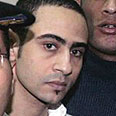
Mohamed Essam Ghoneim el-Attar
צילום: רויטרס
Egyptian suspect denies spying for Mossad
At start of his trial, Egyptian man with Canadian citizenship denies spying for Israeli intelligence, says confession was forced out of him
An Egyptian man with Canadian citizenship denied on Saturday spying for Israeli intelligence and said a confession had been forced out of him.
Mohamed Essam Ghoneim el-Attar, 31, standing trial on the outskirts of Cairo, denied any links with three people charged in absentia with recruiting him to the Israeli intelligence agency Mossad.
"No sir, none of this happened," Attar told the judge who asked him to comment on the charges.
"When I was at the (Egyptian) intelligence headquarters, I came under pressure to confess," he said. The trial was postponed until Wednesday.
Egyptian prosecutors say Attar confessed that Israeli agents had helped him to obtain a residency permit in Canada under a false name and found him a job in a bank.
They said Attar, who was arrested at Cairo airport in January, was paid $56,000 to spy on Egyptians and Arabs during stays in Canada and Turkey and tried to obtain information on Egyptian Coptic Christians abroad.
He was also expected to approach potential recruits.
Israel has dismissed the charges as baseless.
'Shameful betrayal'
The Egyptian media, which hailed Attar's arrest as a triumph for the country's intelligence services, has published what it said were details of his confessions and portrayed him as a spy who had betrayed his country and religion."El-Attar relates the details of his downfall," the state-owned al-Ahram daily newspaper wrote on Saturday, describing his acts as "shameful".
The purported confessions quote Attar as saying he had converted to Christianity and was homosexual, a taboo in the conservative Egyptian Muslim community.
Attar arrived at the court house on Saturday under heavy security and stood inside the defendants' pen. Dressed in a white T-shirt and trousers, he made a victory sign several times to reporters and television cameras.
In 1996, Egypt sentenced Azzam Azzam, an Israeli Arab textile worker, to 15 years in jail for spying for Israel. Egyptian authorities said Azzam passed messages in women's underwear using invisible ink.
Both Azzam and Israel had denied the charges. He was released after eight years as part of a deal that included the release of six Egyptian students in Israel.










